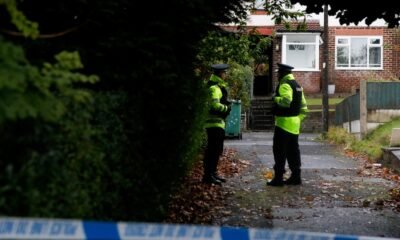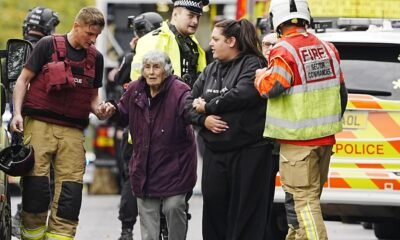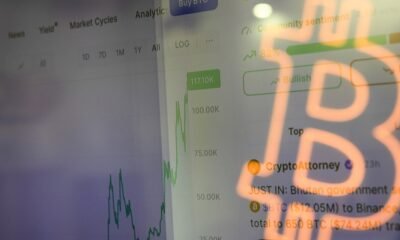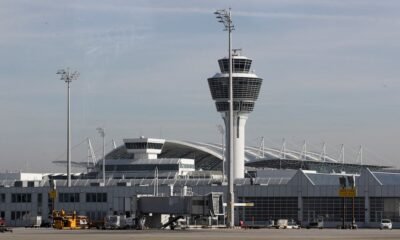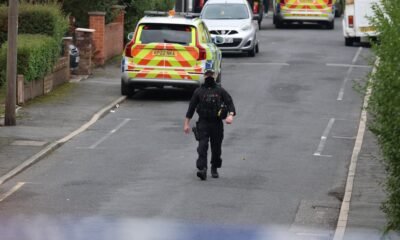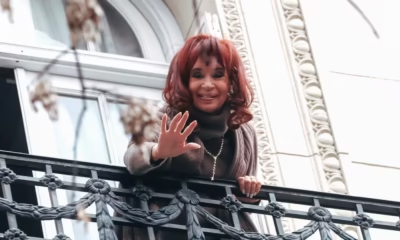INTERNACIONAL
EN VIVO: Rusia y Ucrania reanudan las negociaciones de paz en Estambul tras la “Operación Telaraña” que tomó por sorpresa a Putin

Delegaciones de Rusia y Ucrania se reúnen este lunes en Estambul para una segunda ronda de conversaciones de paz directas, tras tres años de guerra que ha dejado decenas de miles de muertos en ambos bandos. Las negociaciones, que comenzaron poco después de las 13:00 hora local en el histórico palacio de Ciragan a orillas del Bósforo, buscan avances más sustanciales que la primera ronda del 16 de mayo, que solo logró un acuerdo para el intercambio de prisioneros a gran escala.
Las conversaciones se desarrollan en un momento de máxima tensión tras un ataque ucraniano “a gran escala” el domingo que alcanzó territorio ruso hasta Siberia, dañando decenas de aeronaves militares en cuatro bases aéreas. Ucrania reivindicó haber causado daños por 7.000 millones de dólares en el asalto coordinado con drones, mientras Rusia reportó haber derribado 162 drones ucranianos durante la noche, principalmente en las regiones fronterizas de Kursk y Bélgorod.
Las posiciones de ambas partes permanecen irreconciliables: Ucrania exige un “alto el fuego completo e incondicional” y el retorno de prisioneros y niños deportados, mientras Rusia presenta un “memorándum” con condiciones que incluyen la renuncia ucraniana a ingresar a la OTAN y la entrega de cinco regiones anexadas. El presidente ucraniano Volodimir Zelensky sigue solicitando una reunión directa con Vladimir Putin, propuesta que el Kremlin ha rechazado repetidamente.
A continuación, la cobertura minuto a minuto de la jornada de conversaciones a medida que se desarrolla:
El ataque de drones ucranianos en lo profundo de Rusia dio inicio a un nuevo paradigma militar
El uso masivo de naves baratas no tripuladas por parte de Ucrania contra bombarderos rusos plantea un nuevo escenario en la guerra que lleva a repensar inversiones en defensa y la protección de infraestructuras estratégicas
La reciente ofensiva ucraniana contra bases aéreas rusas expuso una vulnerabilidad que, según Max Boot en The Washington Post, debería inquietar a los altos mandos militares de todo el mundo. “Si los ucranianos pudieron infiltrar drones tan cerca de bases aéreas importantes en un estado policial como Rusia, ¿qué impide que los chinos hagan lo mismo con bases aéreas estadounidenses? ¿O los paquistaníes con bases aéreas indias? ¿O los norcoreanos con bases aéreas surcoreanas?”, planteó Boot.
Las fotos de las delegaciones reunidas
El Gobierno turco y las agencias de noticias publicaron fotos de las delegaciones rusa y ucraniana reunidas ahora en el palacio de Ciragan para mantener conversaciones directas.
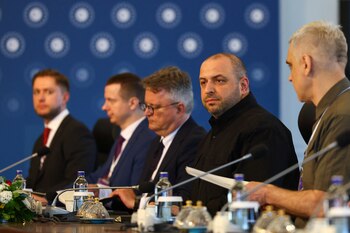
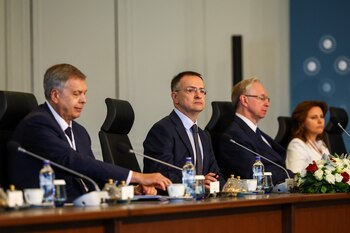
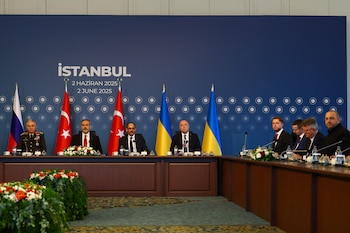
Canciller turco: “El respaldo de EEUU extremadamente importante”

(REUTERS/Murad Sezer)
El apoyo de Estados Unidos a las conversaciones de paz entre Rusia y Ucrania es “extremadamente importante”, afirmó el lunes el máximo representante diplomático de Turquía, mientras ambas partes iniciaban una segunda ronda de negociaciones directas en Estambul.
“Consideramos que la confianza y el apoyo de Estados Unidos a estas conversaciones son extremadamente importantes. La determinación del presidente Donald Trump de establecer la paz ha abierto una nueva ventana de oportunidad”, declaró el ministro de Asuntos Exteriores, Hakan Fidan.
La advertencia de dos senadores de EEUU: “Putin se está preparando para más guerra”
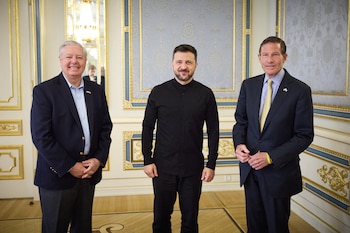
Dos senadores estadounidenses de alto rango advirtieron el domingo que el presidente ruso Vladimir Putin está jugando al tiempo en las conversaciones de paz mientras prepara una nueva ofensiva militar en Ucrania, argumentando que las próximas dos semanas podrían determinar el futuro de una guerra que ya ha devastado ciudades y desplazado a millones de personas. El senador republicano Lindsey Graham y el demócrata Richard Blumenthal hablaron con The Associated Press tras reunirse con el presidente Volodimir Zelensky y recorrer barrios destruidos por lo que calificaron como los peores bombardeos rusos desde el inicio de la invasión a gran escala.
Los legisladores, que se encuentran en París para conversaciones con el presidente francés Emmanuel Macron, advirtieron que la ventana para prevenir un renovado asalto se está cerrando. Graham afirmó haber visto “evidencia creíble de una invasión de verano o principios de otoño, una nueva ofensiva de Putin”, mientras que Blumenthal acusó al líder ruso de “dilatar y obstaculizar, prolongando la conversación para poder montar esta ofensiva y tomar control de más territorio”. Los senadores dijeron que las conversaciones de paz que se reanudaron este lunes en Estambul son una táctica dilatoria, ya que Moscú aún no ha presentado una propuesta seria.
En el centro de su impulso está un proyecto de ley de sanciones bipartidista, respaldado por casi todo el Senado estadounidense pero que enfrenta perspectivas inciertas en Washington. La legislación impondría aranceles del 500% a países que continúen comprando petróleo, gas, uranio y otras exportaciones rusas, apuntando a naciones como China e India que representan aproximadamente el 70% del comercio energético de Rusia. Graham calificó la medida como “el proyecto de ley más draconiano que he visto en mi vida en el Senado”, mientras que Blumenthal la describió como “devastadora” y dijo que colocaría la economía rusa “en una isla comercial”.
Los senadores expresaron esperanzas de que sus hallazgos de primera mano ayuden a cambiar el impulso en Washington y convencer al escéptico presidente Donald Trump de respaldar las sanciones. Tras una reunión de una hora con Macron, ambos dijeron estar convencidos de que Europa está lista para endurecer su postura, con Blumenthal señalando que el presidente francés está “100% alineado” con su mensaje. Trump aún no ha respaldado el proyecto de ley de sanciones, diciéndole a reporteros el viernes: “No sé. Tendré que verlo”.
Los mercados globales, golpeados por la guerra
Los mercados financieros globales cayeron el lunes mientras los precios del petróleo se dispararon en medio de la escalada de tensiones geopolíticas por el conflicto entre Rusia y Ucrania. Las acciones asiáticas y europeas retrocedieron, con el índice Hang Seng de Hong Kong perdiendo 0.6% y el DAX alemán bajando 0.4%, mientras los futuros estadounidenses también marcaron descensos. Los precios del crudo de referencia estadounidense subieron $2.08 a $62.87 por barril y el Brent internacional ganó $1.75 a $64.53 por barril.
La volatilidad de los mercados se intensificó horas antes de que delegaciones rusas y ucranianas se reunieran para una nueva ronda de conversaciones de paz directas en Estambul. Moscú bombardeó Ucrania con misiles y drones en las horas previas a las negociaciones, mientras que un ataque ucraniano con drones destruyó más de 40 aviones rusos en territorio ruso, según informó el domingo el Servicio de Seguridad de Ucrania.
Los mercados también enfrentaron presión adicional por las crecientes tensiones comerciales entre Estados Unidos y China, con el presidente Donald Trump anunciando que duplicará los aranceles sobre acero y aluminio al 50%. La combinación de incertidumbre geopolítica por el conflicto ucraniano-ruso y las disputas comerciales alimentó la aversión al riesgo entre los inversores, llevando a una jornada de pérdidas generalizadas en las bolsas mundiales mientras los precios de las materias primas energéticas se beneficiaron de las preocupaciones sobre el suministro.
Keir Starmer advirtió que el Reino Unido debe prepararse para la guerra ante la amenaza real de Rusia
El gobierno británico anunció un ambicioso plan de defensa, con inversiones en submarinos nucleares y municiones, para responder a la creciente tensión internacional y fortalecer la seguridad nacional
El primer ministro británico, Keir Starmer, afirmó este lunes que el Reino Unido debe avanzar hacia una “preparación para la guerra” ante lo que describió como una amenaza real e inmediata por parte de Rusia. En un discurso pronunciado en Glasgow, el líder laborista sostuvo que la agresión del Kremlin representa el desafío más grave para la seguridad europea desde el final de la Guerra Fría y llamó a “cada parte de la sociedad” a asumir su responsabilidad en la defensa nacional.
El avance de Rusia en Ucrania se aceleró en primavera: datos del ISW
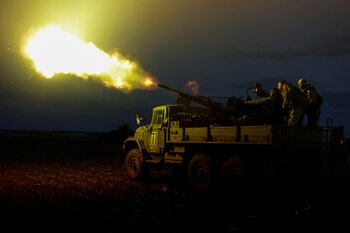
Mientras la segunda ronda de conversaciones está a punto de empezar en Estambul, la guerra en el terreno continúa. Este lunes, un análisis de AFP basado en datos del Instituto para el Estudio de la Guerra (ISW) mostró que las fuerzas rusas aceleraron significativamente su avance territorial en Ucrania durante la primavera de 2025, recuperando el impulso tras una desaceleración invernal. Las tropas rusas capturaron 507 kilómetros cuadrados en mayo, un aumento notable respecto a los 379 kilómetros cuadrados de abril y los 240 kilómetros cuadrados de marzo.
El avance ruso de mayo se concentró nuevamente en la región oriental de Donetsk, que representó casi 400 kilómetros cuadrados del territorio ganado, de acuerdo al centro de estudios con sede en EEUU. Las fuerzas ucranianas no lograron recuperar ningún territorio durante ese mes, continuando una tendencia que se ha mantenido durante el último año en el que Ucrania no ha conseguido retomar territorios perdidos.
Durante el período de junio de 2024 a mayo de 2025, Rusia ganó un total de 5.107 kilómetros cuadrados —menos del uno por ciento del territorio ucraniano anterior a la guerra— mientras que las fuerzas ucranianas solo recuperaron 85 kilómetros cuadrados. A finales de mayo, Rusia controlaba total o parcialmente casi el 19 por ciento del territorio ucraniano previo al conflicto, incluyendo Crimea y el Donbass.
El patrón de aceleración primaveral se repitió respecto al año anterior: en la primavera de 2024, el avance ruso también ganó velocidad, con las tropas de Moscú tomando 449 kilómetros cuadrados en mayo, tras 111 kilómetros cuadrados en abril y 50 kilómetros cuadrados en marzo de ese año.
Qué exige cada parte para alcanzar un acuerdo de paz

Las delegaciones rusa y ucraniana presentarán este lunes sus visiones sobre un posible acuerdo de paz, pero sus demandas permanecen fundamentalmente incompatibles tras tres años de guerra. Rusia exige retener todo el territorio ocupado en el sur y este de Ucrania, incluyendo las cuatro regiones anexadas en 2022 —Donetsk, Lugansk, Zaporizhzhia y Kherson— además de Crimea, ocupada en 2014. Putin demandó el año pasado que Ucrania retire sus fuerzas incluso de las partes de esas regiones que aún controla como prerrequisito para cualquier acuerdo.
En la primera ronda de mayo, según Kiev, Moscú repitió estas demandas territoriales y amenazó con acelerar una ofensiva terrestre hacia las regiones de Sumy y Kharkiv. El canciller ruso Serguéi Lavrov ha calificado el reconocimiento de la propiedad de Moscú sobre estos territorios como “imperativo” para cualquier negociación. Ucrania ha declarado que nunca reconocerá los territorios ocupados como rusos, aunque Zelensky ha sugerido que Kiev podría verse obligado a intentar recuperarlos por medios diplomáticos.
Moscú también demanda que Ucrania renuncie definitivamente a ingresar a la OTAN, limite el tamaño de su ejército y se declare un estado neutral, además de cesar el flujo de armas occidentales. Putin ha insistido en la remoción del presidente Zelensky y en marzo propuso colocar a Ucrania bajo una “administración temporal” respaldada por la ONU. Los funcionarios rusos han pedido la “desmilitarización” y “desnazificación” de Ucrania, narrativa rechazada por Kiev y Occidente.
Por su parte, Ucrania exige un “alto el fuego completo e incondicional” que cubra combates terrestres, aéreos y marítimos, seguido de la liberación de prisioneros y el retorno de niños deportados. Zelensky busca “garantías de seguridad” occidentales para prevenir futuras invasiones rusas, idealmente el ingreso a la OTAN o la protección del Artículo 5 de defensa colectiva. Con Trump descartando la membresía ucraniana en la OTAN y Putin calificándola de “inaceptable”, Kiev presiona por otros compromisos militares occidentales, incluyendo las discusiones lideradas por Reino Unido y Francia sobre un posible despliegue de tropas europeas para hacer cumplir cualquier alto el fuego.
Putin ha rechazado los llamados ucranianos y occidentales a un alto el fuego inmediato, insistiendo en que las conversaciones deben abordar las “causas profundas” del conflicto, que según Moscú incluyen agravios con Kiev y la expansión occidental hacia antiguos países soviéticos o comunistas.
Telaraña letal: el golpe de drones ucranianos que derriba la ilusión de una retaguardia segura en Rusia
La operación llevada a cabo por Kiev explotó los “puntos ciegos” inherentes a la extensa red de defensa aérea rusa. Representa, además, un hito en la evolución de la guerra con aviones no tripulados, y demuestra el creciente papel de la IA en misiones militares
Este domingo 1 de junio, Ucrania ejecutó una operación sin precedentes, denominada “Operación Telaraña”, que implicó un ataque coordinado contra múltiples bases aéreas rusas, algunas ubicadas a miles de kilómetros de la frontera ucraniana. Esta operación se distinguió por su innovadora metodología de infiltración, empleo de nuevas tecnologías, capacidad de inteligencia, comunicaciones avanzadas, inteligencia artificial aplicada, adaptación de tecnologías existentes, buen OPSEC, y mucha paciencia. Según las autoridades ucranianas, más de 40 aviones militares, incluyendo bombarderos estratégicos y aeronaves de alerta temprana, fueron afectados por la operación. El presidente ucraniano, Volodymyr Zelenskyy, declaró que se desplegaron un total de 117 drones en la operación. El ataque ha sido calificado como un “golpe importante” para los servicios de inteligencia rusos y desafía la percepción de seguridad en el interior de Rusia. La operación, si se confirma la magnitud de los daños, sería un “gran bochorno” para las agencias militares y de inteligencia de Rusia. La capacidad de Rusia para restaurar estas aeronaves, especialmente los modelos Tu-95, Tu-22 y Tu-160, que ya no se producen, sería extremadamente difícil. Aunque Rusia confirmó los ataques y los daños en algunas regiones, la magnitud exacta de las pérdidas no ha sido verificada de forma independiente.
Una sorprendente incursión en el interior de Rusia reescribe las reglas de la guerra
Los ataques de alto riesgo de Ucrania dañan más de 40 bombarderos estratégicos de alto secreto

Poco después del mediodía del 1 de junio, las redes sociales rusas comenzaron a alertar al mundo sobre la operación más audaz de Ucrania en territorio ruso hasta la fecha. En la provincia de Irkutsk, en el este de Siberia, a unos 4000 km de Ucrania, los lugareños publicaron imágenes de pequeños drones cuadricópteros que salían de camiones y volaban hacia un aeródromo cercano, sede de algunos de los bombarderos estratégicos más importantes de Rusia. “Trabajo en una tienda de neumáticos”, escribió uno. “Llegó un camión y salieron drones volando de él”. Desde una base aérea cerca de Murmansk, en el extremo norte de Rusia, llegaron historias similares: “El conductor está corriendo… los drones están volando desde su camión hacia la base”. Pronto siguieron otras publicaciones alarmantes desde bases aéreas en las provincias de Riazán e Ivanovo, en el centro de Rusia.
Diplomacy / Foreign Policy,Europe,Middle East,ISTANBUL
INTERNACIONAL
La Policía británica identificó a las dos víctimas del ataque terrorista en una sinagoga de Manchester durante Yom Kippur

La Policía británica identificó este viernes a las dos víctimas mortales del atentado perpetrado el jueves frente a la Sinagoga de la Congregación Hebrea de Heaton Park. Se trata de Adrian Daulby, de 53 años, y Melvin Cravitz, de 66, ambos residentes de la zona. El ataque, ocurrido en plena celebración de Yom Kippur, la festividad más sagrada del calendario judío, dejó además a tres personas gravemente heridas.
El ataque comenzó cuando un vehículo embistió a varios peatones frente a la sinagoga y, poco después, un hombre fue apuñalado. A las 9:31 (hora local), un testigo dio aviso a las fuerzas de seguridad, informando tanto del atropello como de la agresión con arma blanca.
Siete minutos más tarde, la policía desplegó agentes armados que abrieron fuego contra el atacante, quien, según confirmaron las autoridades, murió en el lugar. A las 9:41, el Servicio de Ambulancias del Noroeste llegó a la zona y brindó asistencia a las personas heridas, cuyos estados de salud aún no han sido precisados.

La investigación identificó al agresor como Jihad Al-Shamie, de 35 años, ciudadano británico de origen sirio. La Policía de Manchester informó que en redes sociales comenzó a circular una fotografía del sospechoso vestido de negro y con un cinturón al que llevaba adheridos varios paquetes blancos, lo que hace sospechar que intentaba simular o portar material explosivo.
Después de ser abatido, la policía localizó un cuchillo junto al cuerpo y un robot desactivador de explosivos inspeccionó el lugar y los objetos hallados sobre el atacante para descartar la presencia de artefactos peligrosos.
El jefe del área metropolitana, Andy Burnham, declaró que “no es un incidente en desarrollo o en curso” y señaló que el sospechoso se encontraba muerto, eliminando el peligro inmediato. Burnham pidió no especular en redes sociales y destacó que la comunidad judía de Manchester estaba preocupada por lo ocurrido.
El jefe de la Policía de Manchester, Sir Stephen Watson, informó que el sujeto llevaba “un chaleco que tenía la apariencia de un dispositivo explosivo”. Subrayó la rapidez de la intervención policial y agradeció la valentía del personal de seguridad y de los congregados, que ayudaron a impedir que el atacante ingresara al templo, que estaba abarrotado por la festividad.
La Community Security Trust (CST), representada por Dave Rich, condenó el ataque como “espantoso en el día más sagrado del año judío” y agradeció la actuación de la policía y del personal de seguridad. Rich explicó que Yom Kippur es un día de alta asistencia a las sinagogas, por lo que existe un operativo conjunto de seguridad entre la policía y CST durante las festividades.
Por su parte, el primer ministro británico, Keir Starmer, regresó de urgencia de una cumbre en Copenhague para presidir una reunión del comité de emergencia COBRA y reforzar la seguridad en todas las sinagogas del Reino Unido. Además, expresó en X sentirse “horrorizado” y reconoció la labor de los servicios de emergencia.
“El hecho de que esto haya ocurrido en Yom Kippur, el día más sagrado del calendario judío, lo hace aún más horrible”, declaró.
En paralelo, el rey Carlos III manifestó encontrarse “profundamente conmocionado y apenado”, mientras que la embajada de Israel en Londres calificó el atentado como “odioso y profundamente perturbador”.
La acción generó además una ola de repudio de organizaciones musulmanas, cristianas y autoridades políticas, que llamaron a la convivencia pacífica y al respeto interreligioso, en un contexto de creciente preocupación por incidentes antisemitas e islamófobos en el Reino Unido desde el ataque de Hamas contra Israel en octubre de 2023 y la posterior guerra en Gaza.
Luego de un día, la Policía Metropolitana de Londres mantiene la zona acordonada y sigue analizando las pruebas recogidas en el área y en posibles ubicaciones vinculadas al sospechoso. Según las autoridades, la investigación avanza “a buen ritmo” y la prioridad es “mantener la seguridad pública”.
(Con información de REUTERS)
Crime,Law Enforcement,Crime,Europe
INTERNACIONAL
Unearthed debate clip goes viral against Dems as illegal immigrant health coverage becomes top issue
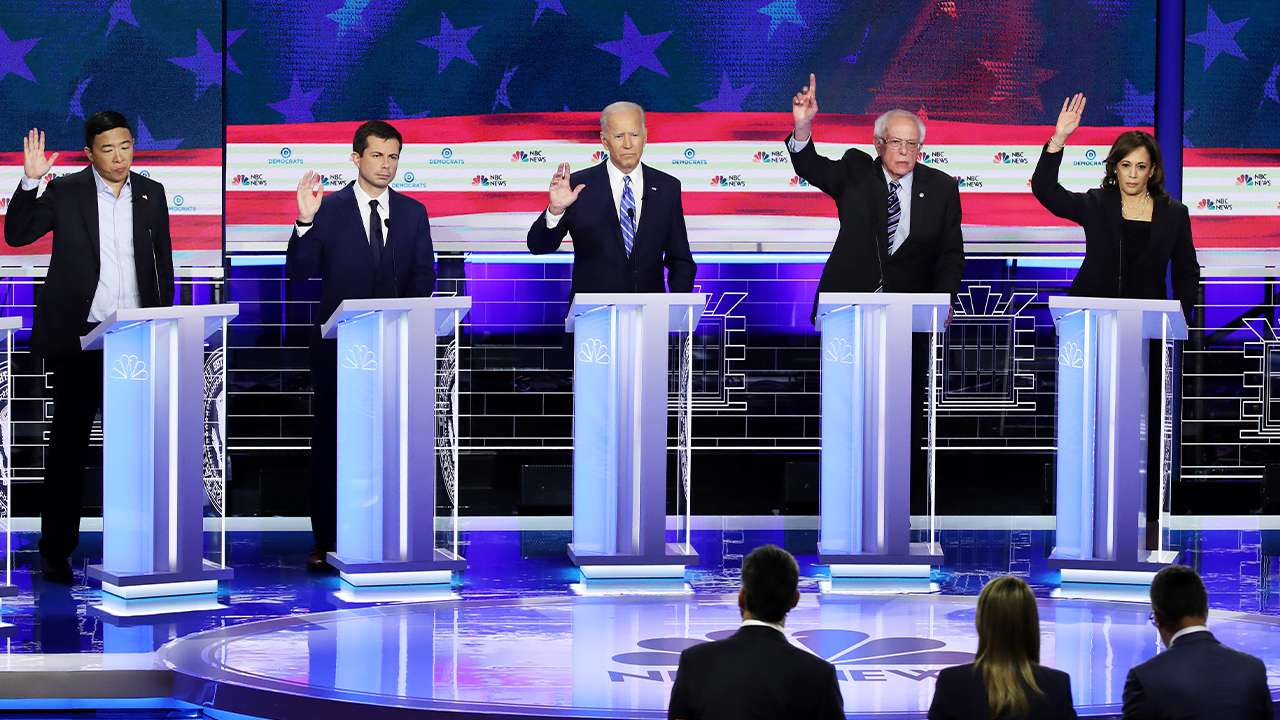
NEWYou can now listen to Fox News articles!
As the federal government shutdown continues, a clip from the 2019 Democratic presidential primary went viral when the candidates were asked if they support providing healthcare to those in the country illegally.
«Is JD Vance a liar or just woefully ignorant when claiming that Democrats want to give health benefits to undocumented immigrants?» disgraced ex-Democratic Minnesota Sen. Al Franken posted to X on Wednesday, leading to the clip being posted in the comments by one user.
«Raise your hand if your government plan would provide coverage for undocumented immigrants,» NBC News anchor Savannah Guthrie asked while moderating the June 2019 debate followed by all ten Democrats on stage raising their hands.
JOHNSON SAYS DEMOCRATS LYING ABOUT ILLEGAL IMMIGRANT HEALTHCARE PUSH
Before he entered politics, Al Franken was a performer on «Saturday Night Live» for a decade. (R. Diamond/Getty Images)
Franken’s post triggered a range of responses, including from conservatives.
CLICK HERE FOR MORE IMMIGRATION COVERAGE
«You should stick to intimate photography,» GOP communicator Matt Whitlock posted on X, referring to the disgraced ex-senator’s scandal that included a photo of him smiling while posing and groping radio host Leeann Tweeden, who was sleeping in the photo.
DEMS IN THE HOT SEAT AFTER OBAMACARE’S SPIKING PREMIUM COSTS TORPEDO THEIR NARRATIVE
«Why don’t we let Democrats answer that?» Heritage Action said, posting the debate clip.
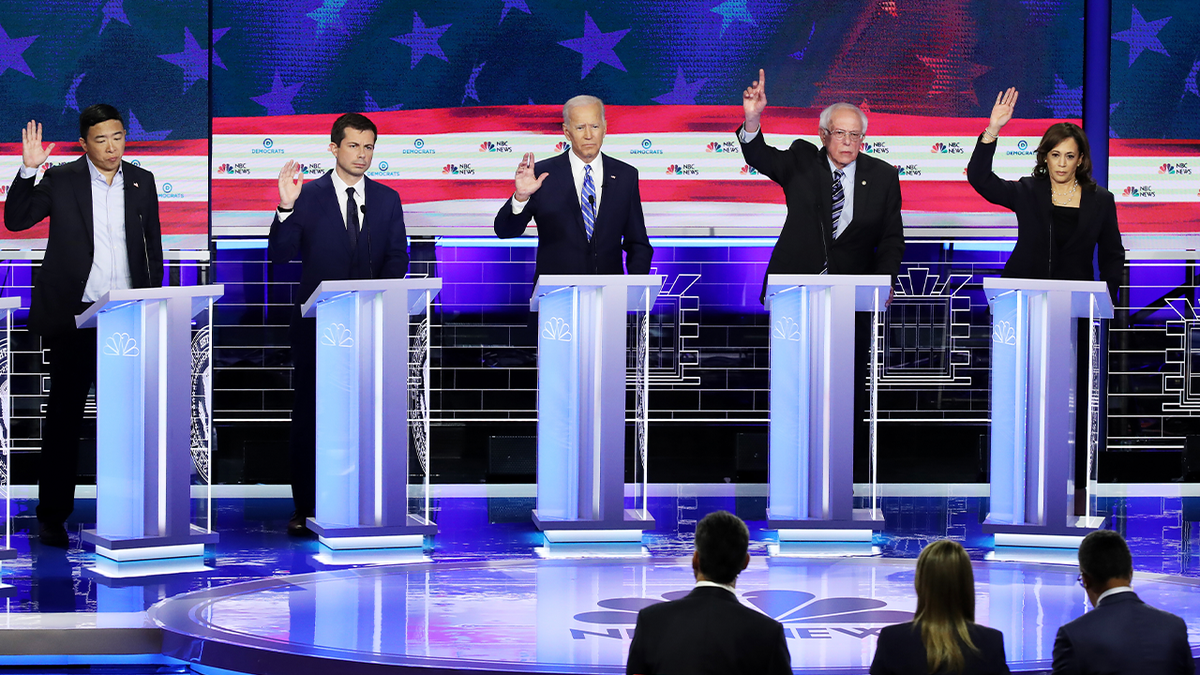
Democratic presidential candidates debate each other on NBC News in June 2019 in Miami, Florida. (Drew Angerer/Getty Images)
The clip, which included multiple current members of Congress like Rep. Eric Swalwell, D-Calif., Sen. Kirsten Gillibrand, D-N.Y. and Sen. Bernie Sanders, I-Vt., also garnered the attention of billionaire Tesla and SpaceX CEO Elon Musk, who posted «lol» in response to the debate video, which means «laugh out loud.»
Part of the ongoing government shutdown debate centers on subsidies for the Affordable Care Act, which would lead to a rise in premiums that opponents say prove that the program is unsustainable.
Illegal immigrants are unable to get insurance on the ACA marketplace, but Emergency Medicaid is covered as well as several states that use state taxpayer dollars for illegal immigrants to enroll in Medicaid.
SPEAKER JOHNSON, ABC’S STEPHANOPOULOS CLASH OVER GOVERNMENT SHUTDOWN, ILLEGAL IMMIGRANTS GETTING HEALTHCARE
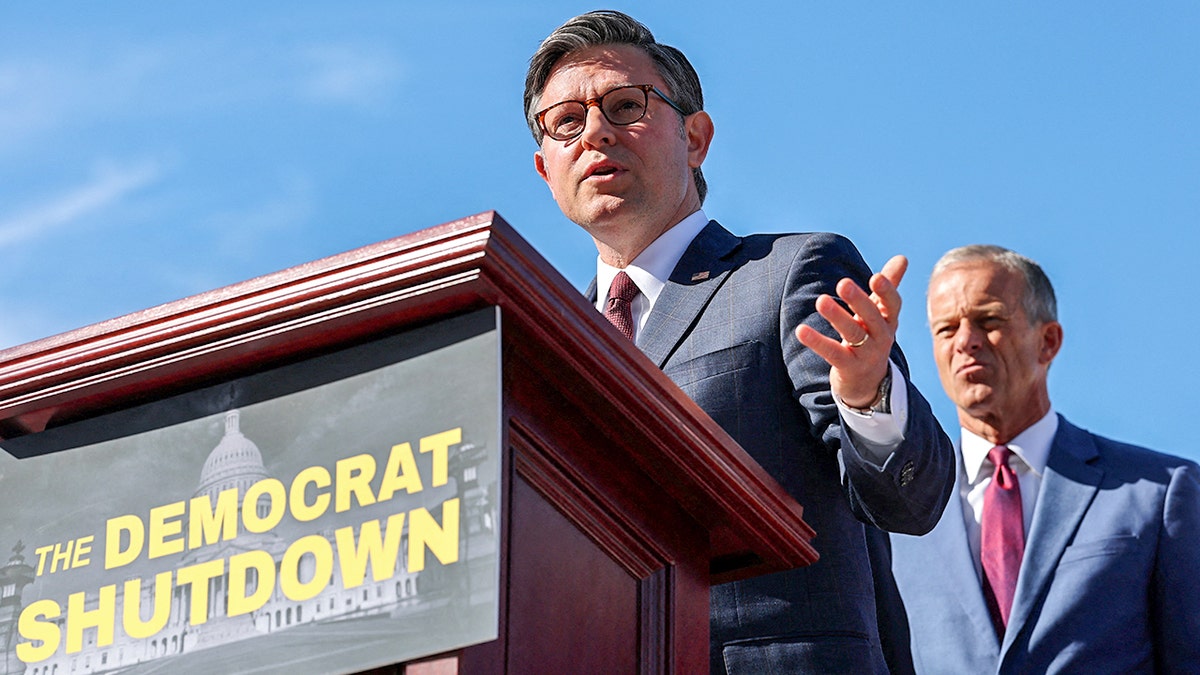
Speaker of the House Mike Johnson (R-LA) speaks as U.S. Senate Majority Leader John Thune (R-SD) looks on during a press conference on the first day of a partial government shutdown, at the U.S. Capitol, in Washington, D.C., Oct. 1, 2025. (Jonathan Ernst/Reuters)
However, California was once the subject of a federal audit where they were recommended to refund over $52.7 million in «improperly claimed» medical costs for those with «unsatisfactory immigration status.»
«Democrats are now trying to run away from their RIDICULOUS $1.5 Trillion big government spending bill — now that Americans are learning what’s in it,» House Speaker Mike Johnson posted to X on Thursday. «Some Democrats now claim they don’t want illegal immigrants on Medicaid — but their previous votes, and the ACTUAL LANGUAGE of their current bill, say otherwise.»
CLICK HERE TO GET THE FOX NEWS APP
However, some Democrats have also criticized Republicans for bringing up state-based Medicaid programs that offer coverage to illegal immigrants.
«This isn’t funded by the Federal Government or ACA Tax credits. [The Vice President] is lying again. However if he wants to tell the GOP to write a bill to exclude illegal immigrants from buying on the market and restore ACA tax credits to 24 million Americans, I would be game,» Sen. Ruben Gallego, D-Ariz., said in response to a post from Vice President JD Vance, which included a screenshot showing New York’s public health insurance coverage for «undocumented immigrants over age 65.»
As of Thursday afternoon, it’s unclear when the shutdown will end.
immigration,2020 presidential election,health care healthy living,congress
INTERNACIONAL
Seis minutos que aterrorizaron Manchester: la cronología del ataque a la sinagoga durante Yom Kippur
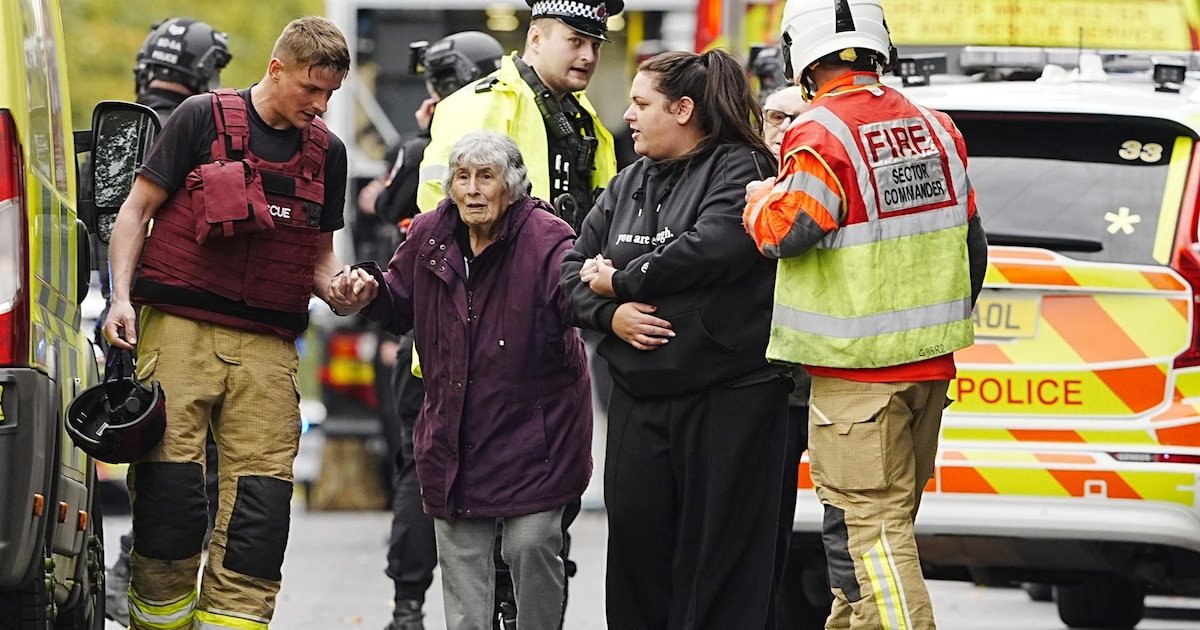
En apenas seis minutos, la comunidad judía de Heaton Park, en el norte de Manchester, vivió una secuencia de violencia extrema durante la celebración de Yom Kippur, el día más sagrado del calendario hebreo.
Lo que comenzó como un servicio religioso matutino terminó en tragedia cuando un atacante embistió con su auto las puertas del templo y luego apuñaló a quienes encontró en su camino. Hacia las 9:31 de la mañana, el rabino Daniel Walker tenía su túnica blanca manchada de sangre y el caos se había apoderado de la zona.
En los instantes previos al atentado, testigos observaron cómo un vehículo negro circulaba erráticamente antes de chocar contra el portón de la sinagoga. Al principio, algunos pensaron que podría tratarse de un accidente o una emergencia médica, pero inmediatamente el conductor salió vestido de negro y comenzó a atacar a los presentes con un cuchillo. “Fue un frenesí”, relató un testigo. Un anciano quedó tendido sin moverse a la entrada y otra persona cayó junto al capó del automóvil.
El agresor intentó forzar la entrada, rompiendo ventanas y buscando acceder al salón principal, mientras fieles bloqueaban las puertas. Al mismo tiempo, dentro y fuera del templo, se vivían escenas de pánico y desesperación. “Vi sangre en la bata del rabino”, comentó Josh Aronson, periodista que se encontraba en las cercanías. Cuatro personas terminaron hospitalizadas en estado grave y otras dos murieron a raíz de las heridas.
Los minutos finales del ataque se precipitaron cuando policías armados respondieron con rapidez. El agresor, al ser interceptado, mostró objetos en su cintura que alarmaron a los oficiales y a quienes miraban desde el interior. “¡Tiene una bomba!”, gritó uno de los presentes. Temiendo más peligro, los agentes dispararon e inmovilizaron al atacante. Al comprobar que los objetos no eran explosivos, procedieron a asegurar la escena y declararon un incidente de terrorismo mayor a las 9:37. En paralelo, se activó el protocolo para ataques múltiples y arribaron equipos especiales y el escuadrón antibombas.
“Escuché un gran estruendo, luego disparos, y en minutos había policías armados y cordones de seguridad por todas partes”, relató Fran Barrie, una vecina que observó lo ocurrido desde una vivienda cercana. “Tuvimos que evacuar el edificio, nos pidieron que fuéramos hacia el fondo y luego salimos por una zona segura; pasamos cerca del robot antibombas, estoy todavía en shock”.
Las autoridades evacuaron la sinagoga y los edificios aledaños, mientras expertos en explosivos realizaron varias detonaciones controladas, incluida una en el vehículo usado por el agresor. La policía identificó al atacante como Jihad Al-Shamie, ciudadano británico de origen sirio, y detuvo a tres personas más bajo sospechas de terrorismo. Dos hombres y una mujer permanecen bajo investigación por supuesta colaboración o incitación de los hechos.
La comunidad judía de Crumpsall, escenario del ataque, ya había sufrido antecedentes recientes de amenazas y mensajes antisemitas. Según datos de la Community Security Trust, se han registrado alrededor de 200 incidentes similares en el área solo en la primera mitad del año. En las horas posteriores, la policía reforzó la vigilancia en sinagogas y hospitales y pidió calma ante el temor de nuevos episodios.
“Esto debe ser una llamada de atención sobre la necesidad de diálogo y la lucha contra el odio”, expresó el propio Aronson, aún conmovido. Mientras voluntarios asistían a quienes abandonaron el templo en medio del trauma, integrantes de la comunidad lamentaban que el ataque haya coincidido con la festividad sagrada del Yom Kippur.
Al cierre del día, la investigación policial seguía en marcha y los controles de seguridad se mantenían extendidos. Para los residentes y los fieles de Heaton Park, la mañana de terror dejó una huella imborrable que reabre el debate sobre la protección de las minorías religiosas y las consecuencias de la ola de intolerancia en la región.
Crime,Law Enforcement,Crime,Europe

 POLITICA2 días ago
POLITICA2 días agoCristina Kirchner chicaneó a Javier Milei: “La Recesión Avanza y los dólares se te siguen yendo”

 CHIMENTOS3 días ago
CHIMENTOS3 días agoMario Massaccesi casó a Manu Jove y su colega de TN: los desconocidos detalles de la boda

 POLITICA1 día ago
POLITICA1 día agoAxel Kicillof pide deuda por US$1045 millones y pone a prueba la cohesión del PJ en la Legislatura

